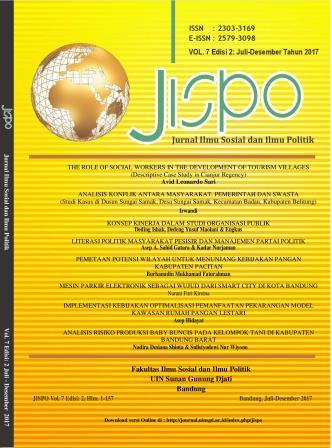LITERASI POLITIK MASYARAKAT PESISIR DAN MANAJEMEN PARTAI POLITIK
DOI:
https://doi.org/10.15575/jp.v7i2.2276Keywords:
Good Governance, Political Literacy, Management of Political Parties, Coastal CommunitiesAbstract
References
Almond, Gabrial A. and Powell, G. Jr. 1966. Comparative Politics: A Development Approach. Bombay: Private Ltd.
Almond, Gabriel A. dan Verba, Sidney. 1984. Budaya Politik; Tingkah Laku Politik dan Demokrasi di Lima Negara. Terjemahan Shat Simamora, Jakarta: Bina Aksara.
BPS Provinsi Jawa Barat, “Indeks Demokrasi Indonesia (IDI Jawa Barat Tahun 2015â€, Jurnal Berita Resmi Statistik, No. 46/08/32/Th.XVII, 05 Agustus 2016.
Bhakti, Andi Faisal dkk,. 2012. Literasi Politik dan Konsolidasi Demokrasi. Jakarta: Churia.
Budiardjo, Miriam. 2004. Dasar-Dasar Ilmu Politik. Jakarta: Gramedia Pustaka Utama.
Cipto, Bambang. 1996. Partai Politik: Prospek dan Tantangan. Yogyakarta: Pustaka Pelajar.
Dahl, Robert A,. 2001. Perihal Demokrasi: Menjelajahi Teori dan Praktik Demokrasi Secara Singkat, Jakarta: Yayasan Obor Indonesia.
Denzin, Norman K. dan Linncoln, Yvonna S. 2009. Handbook of Qualitative Research. Yogyakarta: Pustaka Pelajar.
Gatara, A.A. Sahid. 2009. Ilmu Politik: Memahami dan Menerapkan. Bandung: Pustaka Setia.
Huntington, Samuel P. dan Nelson, Joan M. 1984. Partisipasi Politik di Negara Berkembang, Jakarta: Sangkala Puksar.
Kemmis, Stephen dan McTagart, Robin, “Penelitian Tindakan Partisipatorisâ€, dalam Norman K. Denzin dan Yvonna S. Lincoln. 2009. Handbook of Qualitative Research. Yogyakarta: Pustaka Pelajar.
Khoiron, M. Nur Khoiron, dkk. 1999. Pendidikan Politik Bagi Warga Negara. Yogyakarta: Lkis.
Laswell, Harold D. 1958. Politics, Who Gets What, Whwn And How. New York: World Publishing.
Manulang, M. 1977. Dasar-Dasar Manajemen. Medan: Monara.
MTI. 2002. Good Governance dan Penguatan Institusi Daerah. Jakarta: MTI dan AusAID.
Rosyada, Dede, et, al. 2003. Civic Education; Demokrasi, Hak Asasi Manusia, dan Masyarakat Madani. Jakarta: ICCE UIN Jakarta.
Rosyidin, Iding. 2017. Pemilu Serentak dan Penguatan Kelembagaan Demokrasi: Perlunya Upaya Literasi Politik. Dalam Proceeding Seminar Nasional Apsipol. Makasar: Universitas Hasanuddin.
Schmnadt, Hendry J. Filsafat Politik: Kajian Historis dari Zaman Yunani Kuno Sampai Zaman Modern. Yogyakarta: Pustaka Pelajar.
Sururie, Ramdani Wahyu dkk,. 2016. Paradigma dan Siklus KKN Sisdamas. Bandung: LP2M UIN Sunan Gunung Djati Bandung.
Ukas, Maman. 2004. Manajemen: Konsep, Prinsip dan Aplikasi. Bandung: Penerbit Agnini.
Varma, SP. 1999. Teori Politik Modern. Terjemahan Yohanes Kristiarto SL. Jakarta: Rajawali Press.
Website
www.cikelet.garutkab.go.id
http://media.unpad.ac.id/thesis/200110/2012/200110120247_4_4550.pdf
https://jabar.bps.go.id/new/website/brs_ind/brsInd-20160805113848.pdf
http://www.kpud-garutkab.go.id
Saepudin, E., & Damayani, N. (2016). Nilai-Nilai Budaya Sunda Dalam Permainan Anak Tradisional Di Desa Sindangkerta Kecamatan Cipatujah Kabupaten Tasikmalaya. JISPO : Jurnal Ilmu Sosial Dan Ilmu Politik, 6(1), 1-22. doi:http://dx.doi.org/10.15575/jp.v6i1.1745
Novianti, E., Sjoraida, D., & Perbawasari, S. (2017). Patterns Of Communication Of Sunda-Minang Interethnic Families In Bandung, Indonesia. JISPO : Jurnal Ilmu Sosial Dan Ilmu Politik, 6(1), 23 - 41. doi:http://dx.doi.org/10.15575/jp.v6i1.1746
Haris, Iir. (2016). Negara Sekular–Islam Deskripsi Pandangan Dr. Muhammad Syahrur mengenai Hubungan Syura, Demokrasi dan Negara dalam Islam. JISPO : Jurnal Ilmu Sosial Dan Ilmu Politik, 1(1), 24-37. doi:http://dx.doi.org/
Downloads
Published
How to Cite
Issue
Section
Citation Check
License
Authors who publish their manuscripts in JISPO agree to the following terms:
- Authors retain copyright and grant the journal right of first publication with the work simultaneously licensed under a Creative Commons Attribution-ShareAlike 4.0 International License that allows others to share the work with an acknowledgment of the work's authorship and initial publication in this journal;
- Authors are able to enter into separate, additional contractual arrangements for the non-exclusive distribution of the journal's published version of the work (e.g., post it to an institutional repository or publish it in a book), with an acknowledgment of its initial publication in this journal; and
- Authors are permitted and encouraged to post their work online (e.g., in institutional repositories or on their websites) after publication process, or prior to and during the submission process, as it can lead to productive exchanges, as well as earlier and greater citation of published work (See The Effect of Open Access).




.jpg)



